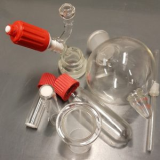




 Absolute Basics of Laser Diffraction Analysis (LDA)
Absolute Basics of Laser Diffraction Analysis (LDA)
Module 4 of the Absolute Basics of Techniques for Determination of Physical & Structural Properties of Molecules course.
Course summary
- Duration: 2 hours
- Experience level: Intermediate
- Course type: Generic, applicable to all instrumentation
- Teaching method: Online via live video, with instrument parts & consumables to see
- Course venue: Virtual Classroom
- Onsite/offsite/online availability: Arrange this course just for you
- Scheduled course price: £120 + VAT per delegate
- Course discount: RSC and CAMS members receive a discount on this course*
What will you learn on this course?
This module is a perfect introduction for absolute beginners to Laser Diffraction Analysis (LDA). The course will cover the what, why, where, when and how of Laser Diffraction Analysis (LDA).
- What is Laser Diffraction Analysis (LDA)?
- Why do we use LDA? How could it help solve problems and what answers could it give?
- When do we use LDA? What types of analytes and samples can you use LDA for?
- How does LDA work? and what instrumentation is available?
- Where do we use LDA? Which applications to answer what questions?
Learning outcomes
- You will learn about the different types of LDA
- You will understand the definition of LDA
- You will learn the principles & limitations of the techniques
- You will learn about the principles and components of LDA instrumentation
- You will learn the purpose and principles of data analysis
- You will learn about different sampling techniques for LDA
- You will learn about a number of industries and their application of LDA
Who is this course for?
- Beginners - those new to Laser Diffraction Analysis.
- Analysts or Technicians looking for a refresher in these techniques.
- Lab Managers and Line Managers - those who are responsible for the instruments or the analysts using them.
- Data Analysts and Report Writers - technical specialists who aren't using the instruments but are using data from them.
- Service Engineers and Consultant Engineers - those who look after or recommend the use of these instruments but don't have the chemistry background or chemistry viewpoint.
- Those involved in the Sales or Marketing of these instruments, their consumables or their use for analysis - e.g. manufacturers, contract labs, media companies.
How to book this course
